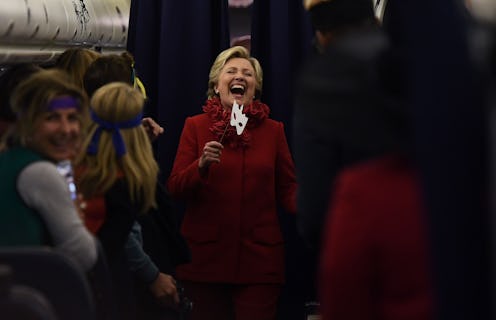News
'Variety' Endorses A Candidate For Prez
Marking the first time Variety has endorsed a presidential candidate in the 111 years since it was founded, on Tuesday morning Variety endorsed Hillary Clinton for president. In its endorsement, the Variety editors Claudia Eller and Andrew Wallenstein (as well as their publisher Michelle Sobrino-Stearns) noted that while it's common for large scale newspapers like The New York Times to endorse Clinton, it's far more rare for a show-business trade publication to endorse a presidential candidate.
When Variety was originally founded in 1905, it was a weekly magazine in New York dedicated to reporting theater, vaudeville, burlesque and all things stage-related. As it has evolved into an online outlet, Variety has maintained its commitment to reporting and reviewing the arts and entertainment, but their historical endorsement of Clinton revealed a shift in social responsibility.
In their letter of endorsement, the editors noted that due to the polarizing campaign of Donald Trump this election The Atlantic also endorsed Clinton, which is equally historical since they've only endorsed three total presidential candidates since their launch in 1857 (Abraham Lincoln being one of them). In a similar vein to The Atlantic, the editors at Variety wrote that they felt compelled to endorse Clinton so as not to fall on the wrong side of history.
Citing both her measured temperament and many years of political experience, the endorsement also brought up Clinton's dedication to diversity and ensuring rights for the disenfranchised, bringing up her many years of experience negotiating both foreign and domestic policy:
Clinton has been spent her entire life as a social-justice activist, fighting for the rights of women, children, families, the disabled, farmers, veterans, and the LGBTQ community. She has taken on such crucial issues as climate change, racial injustice, and the epidemic of gun violence. She's not "nasty" — she's tough and unafraid to smash barriers, whether it was negotiating strict sanctions against Iran, or brokering a ceasefire between Israel and Hamas. She's a global diplomat who has traveled extensively to forge ties with foreign leaders.
The endorsement went on to compare Clinton's celebration of diversity to Trump's campaign, which they claimed was just a publicity stunt so that he could potentially land another TV gig from which to spread his sexist commentary, before noting the significance of Trump's commentary on the leaked 2005 Access Hollywood tape and the sexual assault allegations that followed.
Perhaps the most distinct through-line in Variety's endorsement of Clinton was the parallels drawn between the shifting demographics of the entertainment industry and the political circus, and how her campaign addresses diversity in a way that echoes the concerns of the arts:
Likewise, in the industry we cover, she enjoys widespread support, having cultivated relationships with entertainment figures dating back to her role as first lady. At a time when the industry is enjoying tremendous growth across borders and cultures, she will understand and embrace the importance of international cooperation and the influence of soft power.
While the endorsement from Variety is automatically notable for its historical nature, it's worth considering whether or not this endorsement will actually help Clinton's campaign. Given the fact that Clinton has been criticized for celebrity support and her coziness with Hollywood money and influence, the endorsement from Variety could potentially further turn off undecided disenfranchised voters. On the other hand, if all publicity is good publicity, then wouldn't good publicity be even better? We will find out soon enough — when the election comes to a head next week.
